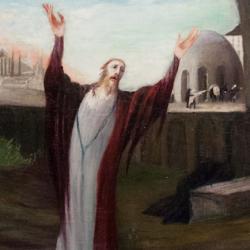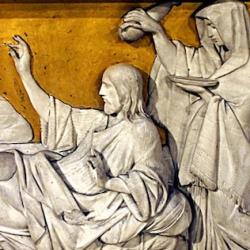INTRODUCTION
Jesus predicted that His disciples would be “delivered” to Gentile kings and governors, and testify to them (Matthew 10:17-20). But it happens to Jesus first. The disciple is not above His master. Jesus the King goes first before the Gentiles.
THE TEXT
“Now Jesus stood before the governor. And the governor asked Him, saying, ‘Are You the King of the Jews?’ Jesus said to him, ‘It is as you say’ . . . . (Matthew 27:11-31).
JESUS AND ROME
Every Jewish teacher in first-century Israel had to deal with the problem of Rome, and Jesus is no exception. When Jesus taught about loving enemies and going a second mile (5:38-48) or told His disciples to return Caesar’s coin to Caesar (22:15-22), He was teaching His disciples how to respond to sometimes brutal overlords. Jesus had also helped a Roman soldier, and commended his faith (Matthew 8:1-13; cf. 2 Kings 5). Now, He stands on trial before Pilate and is mocked by Roman soldiers. Jesus’ trial reveals Pilate’s impotence, but also prepares for the last word of Matthew, the commission evangelized the nations.
PASSOVER EXCHANGE
The first Passover involved an exchange of sons: Yahweh took Egypt’s firstborn sons, and delivered Israel’s. Pilate offers a similar exchange to the Jews (27:16-17, 21). Barabbas (his name means “son of the father”) was a Jewish freedom fighter (Mark 15:7), and so the decision before the Jews is not only a decision between two men but a decision about their future relation to the Roman empire: Will they choose the way of armed revolution or the way of Jesus? They make the fateful choice for Barabbas. Pilate is stuck between the Jews clamoring for Jesus’ death and his wife who, like Joseph and the wise men (Matthew 1:20; 2:12-13, 19, 22), has received revelation in a dream (27:19). Despite his command of a battalion of soldiers, he knows he can do nothing (27:24) bows to the pressure of the “crowd,” fearing a riot (27:24). Washing hands of blood goes back to Deuteronomy 21:1-9, where the elders of the city with an unsolved murder wash their hands and lay the guilt of the murder on a heifer. For their part, “the people” accept the blood of Jesus upon themselves and their children (27:25; cf. 4:23; 13:15; 15:8), and Pilate’s words to the Jews echo the priests’ words to Judas (27:24; cf. 27:4). In the face of his wife’s dream and knowing that Jesus is innocent (27:24), Pilate still sends Jesus off to the cross.
KING OF THE JEWS
Before he is crucified, Pilate gives his solders permission to torture and mock Jesus. It is a mock coronation scene. Jesus wears a royal robe, is crowned, is given a scepter, and then the soldiers bow in mock reverence and acclaim Him King of the Jews (27:27-31). The irony here is multi-layered. The soldiers no doubt intend to mock the Jews as much as Jesus: Here is the king the Jews deserve, the say. Yet God is not mocked: Their mockery reveals the truth. Had they any discernment, the Roman soldiers could have seen this for themselves. During the trial, Pilate essentially ceded authority to the Jewish people. The decision to crucify was theirs, not his, and the solders are acting on orders from the Jews. When they say that Jesus is king of the Jews, they are saying that He is their king too: They carry out His orders. Soon enough, they will confess this without mockery (27:54).











